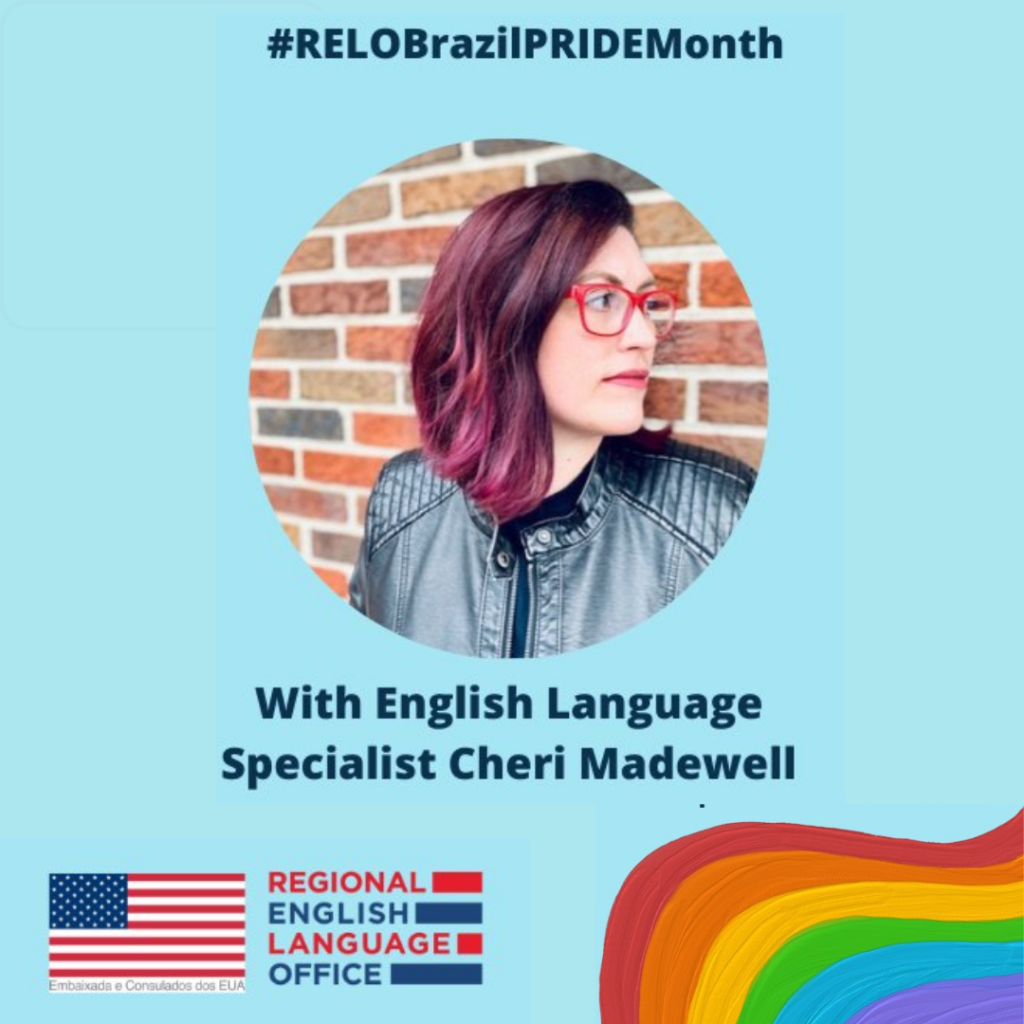I think this project demonstrates the transformative power of dialogue when conversations are engaging and the tone begins within an invitation to participate in multiple ways.
The English Language Specialist program has maintained a commitment to encouraging critical thought and engagement in international English education for over three decades, breaking many boundaries in the process. One of the most recent milestones took place in Brazil, where Specialist Cheri Madewell led the first English Language Programs project with an explicitly LGBTQIA focus.
Over five weekly sessions, Madewell held Pride Conversation Hours for virtual dialogue with a diverse group of teachers from throughout the country. “Brazilian educators learned, practiced, and reflected on LGBTQIA language, terms, concepts, history, laws, societal norms and values from an American perspective,” Madewell says. “By learning, then comparing, evaluating and discussing these similarities and differences, the Pride Conversation Hours met the State Department’s goals of mutual understanding and awareness of American language, society and values through the lens of LGBTQIA culture.”
Madewell’s project prioritized the creation of “brave spaces” in which “teachers establish and then cultivate an environment so that all students may equally participate in challenging dialogue.” Madewell sees her capacity to help project participants identify differences between “safe spaces” and these more engaging “brave spaces” – where growth can involve uncomfortable dialogue – as her greatest contribution to the project, describing it as a “very humbling and rewarding” experience.

The Regional English Language Office (RELO) in Brazil promoted Madewell’s sessions via their social media outlets.
Strategies for Success
Madewell’s background in teacher professional development – particularly in a virtual setting – and gender education made her the professional needed for such a groundbreaking project. Moreover, her past grant projects in these fields in Pakistan, Iraq, and Afghanistan gave her an idea of how best to initially approach her international participants. “When it came to incorporating these specializations, I immediately shared with the participants the objectives and goals for our meetings, and the skills we would develop during our time together,” she recalls. “This was important because I wanted to convey that this event was not simply a presentation of facts. Rather, the aim was to develop their own skills and comfort with the content but also with the process of conversing with others about LGBTQIA-related issues, such as gender and sexuality.”
Just as importantly, Madewell’s approach to the project consistently prioritized the agency of her audience, and positioned her as a facilitator and guide instead of a “sage on the stage.” Madewell adds, “It was important to me that these sessions were not trainings or presentations, but rather engaging and collaborative conversations” during which participants could “reflect on their own experiences and understanding of Brazilian culture to make meaning of our conversations.”
Participants were invited to “co-create” the dialogue, with plenty of room for discussions about bullying, making safe spaces for students, and negotiating difficult conversations with colleagues. Topics had been pre-determined with the RELO Brazil team, who supported Madewell’s introduction of multiple “What if?” scenarios that classroom teachers would likely face.
Madewell (right), in a planning meeting with RELO staff Felipe Ferreira (left) and RELO Maria Snarski (below).
Preparation and Potential
Along with an array of effective strategies and approaches, Madewell credits two educators with being instrumental to the success of this pioneering project. In Brazil, Madewell consulted with a primary educator “on Brazilian LGBTQIA culture, political and non-political issues, to learn how he facilitates LGBTQIA conversations with his students, and relevant local LGBTQIA+ terminology.” Meanwhile, in the United States, she contacted a friend who works as a high school teacher specializing in queer education on social media. She used this friend’s experience to help determine focal points during her own project. “I also asked them to create a series of short videos on LGBTQIA terminology that were then shared on the RELO Brazil Facebook and social media channels,” she adds, giving the project’s development a collaborative component.
The response from Brazil has been positive for this project, with RELO Assistant Helmara Moraes praising the coverage of “important and relevant topic[s]” covered over the five-week period. Likewise, Madewell sees a great deal of potential for future Specialist projects with an LGBTQIA+ context moving forward. “English Language Specialist programs around the globe could facilitate dialogue around gender and LGBTQIA issues that are contextualized and relevant to their community or country,” she suggests. “I think this project demonstrates the transformative power of dialogue when conversations are engaging and the tone for the conversation begins within an invitation to participate in multiple ways.”
Growth Through the Project
With a successful project behind her, Madewell is grateful for the opportunities made available through the Specialist Program. She says that the project was an affirmation of her commitment to working with LGBTQIA+ educators in a multitude of ways. “Though LGBTQIA+ education is not new to me, this was the first time I engaged in a focused initiative that allowed me the opportunity to really dive in with educators on critical topics related to diversity and inclusion for five consecutive weeks,” she says. “What an opportunity!”

Cheri Madewell has an M.A. in Sociology and is currently earning her doctoral degree in Higher Education. She has taught gender studies, international women’s issues, and queer theory courses at multiple institutions for the last decade. She has served as a gender specialist on several international grant projects with the U.S. State Department and other grant funders to the Global South, including Afghanistan, Pakistan, and Iraq. She is currently serving as Director of Instructional Consultation at Ball State University, where she is Chair of the faculty and employee Pride affinity group. Madewell also serves on the university’s Center for Peace and Conflict Studies Advisory Board.
